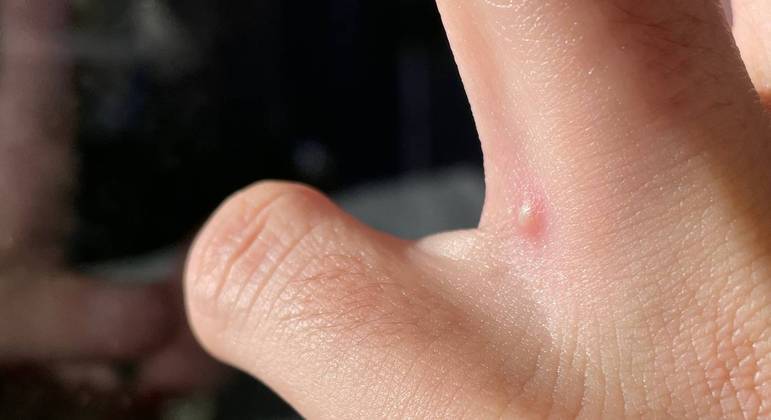With the rise in monkeypox cases – In Brazil, people are also increasingly concerned about how to protect themselves from disease. Comparisons with Covid-19 are inevitable, although experts point out that this virus does not behave in the same way as the coronavirus.
Monkeypox is a disease caused by the monkeypox virus which, although transmitted between animals, can also be transmitted between humans.
The classic form of transmission, observed before the current outbreak in countries in Africa where the disease is endemic, has always involved close contact, either with the skin or with large droplets of respiratory secretions.
Outside of Africa, it has always been limited to a few cases among people living in the same household. This is already the largest outbreak of the disease in history – the first cases were discovered in early May, in the UK and Spain.
Currently, the transmission pattern is associated with sexual activity (95% of cases), as shown by a study published last week in The New England Journal of Medicine Conducted in 16 countries.
The researchers showed that at the present time, cases of the disease are concentrated in men who have sex with men, but any person is susceptible to infection.
This is due to the “decreased global immunity against orthopoxviruses.” [família do monkeypox] And the increase in the number of susceptible individuals, Rosamund Lewis, WHO technical leader, Rosamund Lewis, said at a news conference on Wednesday.
The health agency confirmed for the first time that The disease can be classified as sexually transmitted.
flow
The US Centers for Disease Control and Prevention (CDC) summarizes the main ways the virus is transmitted.
• Direct contact with skin lesions or body fluids of the infected person.
• Respiratory secretions during prolonged face-to-face contact or during intimate contact, such as kissing, foreplay or sex.
• Touching objects (such as clothing or sheets) that a person with the disease has used.
How to protect yourself
With sexual contact being the main form of monkeypox virus infection at this time, WHO Director-General Tedros Adhanom Ghebreyesus stressed the importance of individual protection.
“The best way to do it [frear a taxa de transmissão] It is to reduce the risk of exposure. This means making safe choices for yourself and others.”
The head of the World Health Organization made three behavioral recommendations:
• Reducing the number of sexual partners.
• Reconsider having new sexual partners at this time.
• Exchange of contacts with sexual partners – in case of detection of disease, this facilitates tracing.
“It is a disease transmitted through close contact, and there are other ways of transmission, not just sexual contact, there is skin and mucosal contact. It is important that anyone with monkeypox self-isolate to protect people living together,” Rosamund added.
As a way to avoid illness, the CDC offers the following guidelines:
• Avoid skin contact with people with a monkeypox-like rash (some may look like pimples).
• Do not kiss, hug or have sex with people who have the disease, even if there is a suspicion of it.
• Do not share objects, such as cutlery and bedding, with people who have monkeypox.
In addition, experts consulted by NBC Chicago, for example, recommend avoiding sharing drinks, cigarettes and electronic newspapers at parties.
Individuals with a confirmed or suspected diagnosis should be isolated for the period when skin lesions are present – two to four weeks.
If going outside is necessary, it is important to wear clothing that covers the rash. Those that are exposed, on the face or hands, for example, can be covered with bandages, such as those used after blood tests.
Some places, including cities in the United States, are already vaccinating certain groups of the population with the only approved monkeypox vaccine, produced by the Danish Nordic Bavarian laboratory.
Brazil so far does not have orders for immunity.
symptoms
In addition to the traditional skin lesions, a few days earlier, affected people may show general symptoms of infection. are they:
• Fever
• Cold
• Tired
• Swelling and pain in the lymph nodes behind the ear, in the neck, under the arm, or in the groin
• Back pain and headache
It happens that not all people with rashes have this period of previous symptoms and can confuse the lesions, letting the disease pass unnoticed.
Therefore, it is important to be aware of the incubation period and potential exposure, especially through sexual contact.
General manifestations usually appear between five and 21 days after contact with the virus.
a test
Testing for the virus requires the presence of at least one skin or mucosal lesion.
The examination consists of collecting material from the lesion itself. The laboratory process is real-time PCR, the same technology used to test for Covid-19.
In the city of Sao Paulo, where the largest number of cases in the country is concentrated, the city council announced over the weekend that basic health units and emergency rooms will be able to run tests.
Until then, all cases were concentrated at the Emilio Ribas Infection Institute, and testing was conducted across the state only at the Adolfo Lutz Institute.
There is still no coverage of monkeypox virus tests by health plans.
What still intrigues science about monkeypox

“Wannabe internet buff. Future teen idol. Hardcore zombie guru. Gamer. Avid creator. Entrepreneur. Bacon ninja.”

